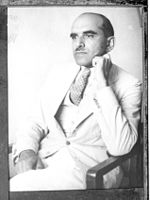Asaf Ali Asghar Fyzee | |||||||||||||||
|---|---|---|---|---|---|---|---|---|---|---|---|---|---|---|---|
 Fyzee in June 1949 | |||||||||||||||
| Ambassador of India to Egypt | |||||||||||||||
| In office 1949-1952 | |||||||||||||||
| Preceded by | Syud Hossain | ||||||||||||||
| Succeeded by | K. M. Panikkar | ||||||||||||||
| Personal details | |||||||||||||||
| Born | 10 April 1899 Matheran, Bombay Presidency, British India | ||||||||||||||
| Died | 23 October 1981 (aged 82) Mumbai, Maharashtra, India | ||||||||||||||
| Relatives | Tyabji family | ||||||||||||||
| Alma mater | St John's College, Cambridge | ||||||||||||||
| Occupation |
| ||||||||||||||
| Awards | Padma Bhushan (1962) | ||||||||||||||
| Notable Works |
| ||||||||||||||
| Cricket information | |||||||||||||||
| Domestic team information | |||||||||||||||
| Years | Team | ||||||||||||||
| 1928-1930 | Muslims | ||||||||||||||
| Career statistics | |||||||||||||||
| |||||||||||||||
Asaf Ali Asghar Fyzee (10 April 1899 – 23 October 1981) was an Indian educator, jurist, author, diplomat, and Islamic scholar who is considered one of leading pioneers of modern Ismaili studies. He also served as India's second ambassador to Egypt from 1949 to 1952, and Vice-Chancellor of the University of Jammu and Kashmir from 1957 to 1960.[1]
His best-known literary work is Outlines of Muhammadan law, which states that "in order to understand Islamic law, one has to be familiar with historic and cultural background of the law".[2][3] He was honoured with the Padma Bhushan award by the President of India in 1962, India's third highest civilian award.[4] In his writings, Fyzee advocates the need to incorporate modern reforms in Islamic law without compromising on the "essential spirit of Islam".[5][6] Fyzee was the grandson of Budruddin Tyabji and a member of the notable Tyabji family.
- ^ Farhad Daftary (30 November 2014). Fifty Years in the East: The Memoirs of Wladimir Ivanow. I.B.Tauris. pp. 91–. ISBN 978-1-78453-152-2.
- ^ "Fyzee, Asaf Ali Asghar – Oxford Islamic Studies Online". Oxfordislamicstudies.com. 6 May 2008. Archived from the original on 5 October 2015. Retrieved 4 October 2015.
- ^ Edited by John L. Esposito. "Fyzee, Asaf Ali Asghar : The Oxford Dictionary of Islam – oi". Oxfordindex.oup.com. Retrieved 4 October 2015.
{{cite web}}:|author=has generic name (help) - ^ Asaf Ali Asghar Fyzee (2005). Cases in the Muhammadan Law of India, Pakistan and Bangladesh. Oxford University Press. ISBN 978-0-19-565450-9.
- ^ "A Modern Approach to Islam: Asaf A. A. Fyzee – Oxford University Press". Ukcatalogue.oup.com. 20 December 2007. Retrieved 4 October 2015.
- ^ Cite error: The named reference
Tayob2009was invoked but never defined (see the help page).